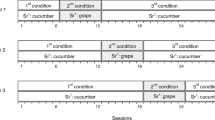Abstract
Brosnan and de Waal (Nature 425:297–299, 2003) reported that if a witness monkey saw a model monkey receive a high-value food, the witness was more inclined to reject a previously acceptable, but low-value food. Later work demonstrated that this alleged inequity aversion might be due to frustration induced by switching subjects from their role as models receiving a high-value food to the role of witnesses receiving a low-value food. In the present study, pairs of female capuchins exchanged a token for either a high- or a low-value food without switching their model–witness roles. Witnesses could exchange a token for a low-value food after an adjacent model had exchanged a token for the same food (Equity Condition) or for a high-value food (Inequity Condition). Failure- and latency-to-exchange measures showed that witnesses were unaffected by the food type offered to models (no inequity aversion). Moreover, models were unaffected by their history of food type offered (no frustration). These results join earlier work suggesting that alleged inequity effects depend on frustration-induction procedures. Furthermore, inequity effects sometimes fail to emerge because frustration induction in nonhuman primates is labile.



Similar content being viewed by others
Change history
20 December 2021
A Correction to this paper has been published: https://doi.org/10.1007/s10071-021-01578-1
References
Amsel A, Roussel J (1952) Motivational properties of frustration: I. Effect on a running response of the addition of frustration to the motivational complex. J Exp Psychol 43:363–368
Bräuer J, Call J, Tomasello M (2006) Are apes really inequity averse? Proc R Soc Lond B Biol Sci 273:3123–3128
Brosnan SF, de Waal FBM (2003) Monkeys reject unequal pay. Nature 425:297–299
Brosnan SF, de Waal FBM (2006) Partial support from a nonreplication: comment on Roma, Silberberg, Ruggiero, and Suomi (2006). J Comp Psychol 120:74–75
Brosnan SF, Schiff HC, de Waal FBM (2005) Tolerance for inequity may increase with social closeness in chimpanzees. Proc R Soc Lond B Biol Sci 272:253–258
Burkart JM, Fehr E, Efferson C, van Schaik CP (2007) Other-regarding preferences in a non-human primate: common marmosets provision food altruistically. Proc Natl Acad Sci USA 104:19762–19766
Dachowski L, Brazier MM (1991) Consummatory incentive contrast: experiment design relationships and deprivation effects. In: Dachowski L, Flaherty CF (eds) Current topics in animal learning: brain, emotion and cognition. Erlbaum, Hillsdale, pp 245–270
Dindo M, de Waal FBM (2007) Partner effects on food consumption in brown capuchin monkeys. Am J Primatol 69:1–9
Dubreuil D, Gentile M, Visalberghi E (2006) Are capuchin monkeys (Cebus apella) inequity averse? Proc R Soc Lond B Biol Sci 273:1223–1228
Fehr E, Schmidt KM (1999) A theory of fairness, competition and cooperation. Q J Econ 114:817–868
Flaherty CF (1996) Incentive relativity. Cambridge University Press, Cambridge
Fletcher GE (2008) Attending to the outcome of others: disadvantageous inequity aversion in male capuchin monkeys (Cebus apella). Am J Primatol 70:901–905
Fontenot MB, Watson SL, Roberts KA, Miller RW (2007) Effects of food preferences on token exchange and behavioural responses to inequality in tufted capuchin monkeys, Cebus apella. Anim Behav 74:487–496
Henrich J (2004) Inequity aversion in capuchins? Nature 428:139
Moody DB, Stebbins WC, Iglauer C (1971) Auditory generalization gradients for response latency in the monkey. J Exp Anal Behav 16:105–111
Riley EA, Dunlap WP (1979) Successive negative contrast as a function of deprivation condition following shifts in sucrose concentration. Am J Psychol 92:59–70
Roma PG, Silberberg A, Ruggiero AM, Suomi SJ (2006) Capuchin monkeys, inequity aversion, and the frustration effect. J Comp Psychol 120:67–73
Silk JB, Brosnan SF, Vonk J, Henrich J, Povinelli DJ, Richardson AF, Lambeth SP, Mascaro J, Schapiro SJ (2005) Chimpanzees are indifferent to the welfare of other group members. Nature 435:1357–1359
Spealman RD (1978) Interactions in multiple schedules: negative induction with squirrel monkeys. J Exp Anal Behav 30:315–327
van Wolkenten M, Brosnan SF, de Waal FBM (2007) Inequity responses of monkeys modified by effort. Proc Natl Acad Sci USA 104:18854–18859
Wynne CDL (2004) Fair refusal by capuchin monkeys. Nature 428:140
Author information
Authors and Affiliations
Corresponding author
Additional information
This study complied with protocols approved by the Italian Health Ministry and all procedures were performed in full accordance with the European law on humane care and use of laboratory animals.
Rights and permissions
About this article
Cite this article
Silberberg, A., Crescimbene, L., Addessi, E. et al. Does inequity aversion depend on a frustration effect? A test with capuchin monkeys (Cebus apella). Anim Cogn 12, 505–509 (2009). https://doi.org/10.1007/s10071-009-0211-6
Received:
Revised:
Accepted:
Published:
Issue Date:
DOI: https://doi.org/10.1007/s10071-009-0211-6




